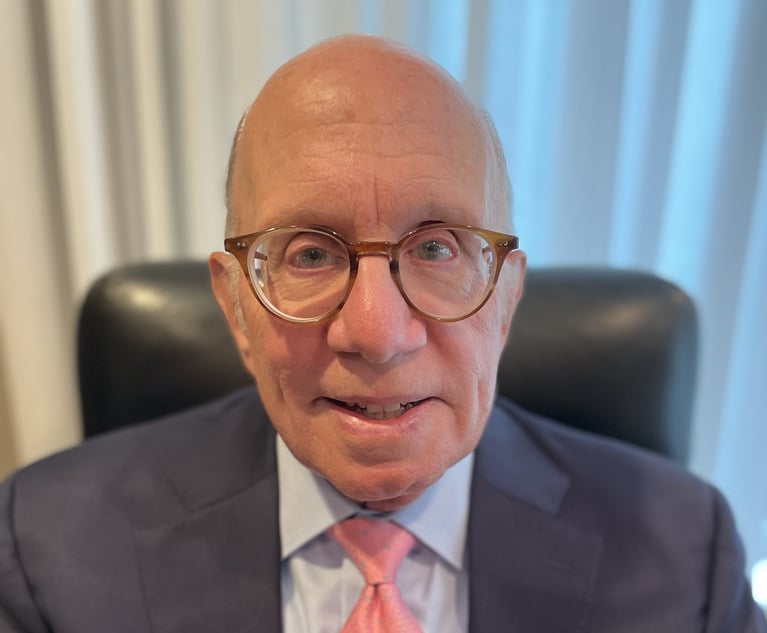 Joel Cohen
Joel CohenLooking Your Client in the Eye—Today
We can't lapse into obtaining the client's facts through the easiest means possible—seated at our home office with the client at his, having become too blasé in performing what's essential to the lawyer's duty to effectively representing the client in obtaining his unadorned truth.
April 16, 2020 at 10:00 AM
6 minute read
I emailed my longstanding doctor the other day, just to check in on his well-being. He graciously responded that he was hunkered down out of town with his family. He seemed bored but was doing, he said, "televisits", itching to get back to in-person work.
I guess there's some value in that. I have never televisited my doctor, or any other doctor. But, clearly, he can learn from you how you're feeling and if you detect a fever, and he can ask if you have any symptoms. Still, from afar he can't take your temperature, take your blood pressure, check your pulse, draw your blood, feel if your bone is out of place, promptly get a urine sample or, certainly not, get you to "assume the position" all on FaceTime. And so, I wondered, is there really a substitute especially in these trying times for a doctor addressing his patient in person, particularly if there appears to be a real potential problem?
And, then, I thought about how we, as criminal lawyers, but also civil litigators in many sensitive instances, are now forced to deal with our "patients". Yes, we don't ever need to put them through the kind of physical testing as would a doctor. But we often—more than often—need to get a sense of them, particularly in terms of what their "story" really is, in ways that are simply insufficient or even impossible remotely.
Edward Bennett Williams, perhaps the greatest criminal lawyer of the 20th century, reportedly would never meet with a client to get to the real "nitty gritty facts" if someone else was present. Not because he didn't want there to be a witness to questionable "witness preparation" on his part. Rather, as the true master Williams was, he recognized that clients under criminal investigation were often facing the most difficult time in their lives. When first discussing the facts with their lawyers, they often cover for "embarrassing" (but not criminal) things they simply don't need to cover for. They often, deliberately or not, omit the role of others, perhaps loved ones, in the misconduct. They often "admit" to things that, upon reflection, they are simply wrong about. And they often straight up lie to their lawyers, particularly in the first few instances, for a whole variety of reasons too exhaustive to enumerate here.
The worst thing in the world, Williams understood, was to have a client, for some emotional reason, wedded in their mind to a prior statement to his lawyer that would turn out to be false, particularly if someone else was in the room (perhaps not as trusted by the client as the client's principal attorney who might conclude that the client is just a total liar). And Williams' protocol to deal with worried clients remains true for many of us today, typically for the same reasons.
But, now, we have a different problem. We're simply not currently in a position to look our clients, particularly new clients, in the eye—in person—and encourage the total truth from them (if we have decided that this is the point in the representation at which we really need to hear "his" facts, as opposed to later). We used to be able to do that in person without words, without reprimanding them, as such. And as it stands today, we're not able to literally hold their hand to get them back on target when they seem to be straying. We're not able to "really" make a facial gesture of disappointment when they seem to be giving us BS, in a way that doesn't cause them to lose faith that we have their best interests at heart or that we're somehow, given their depressed state, adjuncts to the prosecutor herself.
When the lawyer, under the dire circumstances the client faces, may literally be the best friend in the world that the client actually has, talking to the lawyer over the phone or on FaceTime simply doesn't cut it. It doesn't allow that personal face to face interaction that the client—and probably the lawyer too—needs from his "friend".
Do you really want to ask your client remotely—and who knows what is hacked these days—"So what's the deal? Did you truly fear for your life and pull the trigger when the man you killed went to his pocket (for his phone)?" And, it's not only in such bold instances as that. There is always nuance in criminal cases. The very thought of communicating with a client through some medium differing from in person transmittal to get the facts that typically go to the client's "state of mind" warrant the sensitivity that only a personal encounter will allow.
Once again, I mention drift (see "Courtroom Advocacy, When This Is All Over," NYLJ, April 3, 2020). It may be now, of course, that we may have to make a rapid decision when a prosecutor is holding our client's feet to the fire and, unfair as that might be, we simply have to get the client's facts immediately—maybe, for example, to obtain immunity or a favorable plea deal for her. If we can't hold the prosecutor off, we'll simply have to do what we have to do, albeit unfortunately through the prism and with the impediment of social distance.
But when this world shaking catastrophe is over, we can't settle by drifting into what has become convenient for convenience's sake. We can't lapse into obtaining the client's facts through the easiest means possible—seated at our home office with the client at his, having become too blasé in performing what's essential to the lawyer's duty to effectively representing the client in obtaining his unadorned truth.
My doctor is "itching" to put his white coat back on and examine his patients face to face in his office. And so should we be. Lawyer-client televisits to learn the client's critical facts or to arrive at pivotal decisions? I don't think so!
Joel Cohen is senior counsel at Stroock & Stroock & Lavan, where he practices white-collar criminal defense law. He is an adjunct professor at both Fordham and Cardozo Law Schools and is the author of "I Swear: The Meaning of an Oath."
This content has been archived. It is available through our partners, LexisNexis® and Bloomberg Law.
To view this content, please continue to their sites.
Not a Lexis Subscriber?
Subscribe Now
Not a Bloomberg Law Subscriber?
Subscribe Now
NOT FOR REPRINT
© 2024 ALM Global, LLC, All Rights Reserved. Request academic re-use from www.copyright.com. All other uses, submit a request to [email protected]. For more information visit Asset & Logo Licensing.
You Might Like
View All
Patent Trolls Come Under Increasing Fire in Federal Courts

Why Is It Becoming More Difficult for Businesses to Mandate Arbitration of Employment Disputes?
6 minute readLaw Firms Mentioned
Trending Stories
- 1'Water Cooler Discussions': US Judge Questions DOJ Request in Google Search Case
- 2Court rejects request to sideline San Jose State volleyball player on grounds she’s transgender
- 3Trump and Latin America: Lawyers Brace for US's Hardline Approach to Region
- 4Weil Advances 18 to Partner, Largest Class Since 2021
- 5People and Purpose: AbbVie's GC on Leading With Impact and Inspiring Change
Who Got The Work
Michael G. Bongiorno, Andrew Scott Dulberg and Elizabeth E. Driscoll from Wilmer Cutler Pickering Hale and Dorr have stepped in to represent Symbotic Inc., an A.I.-enabled technology platform that focuses on increasing supply chain efficiency, and other defendants in a pending shareholder derivative lawsuit. The case, filed Oct. 2 in Massachusetts District Court by the Brown Law Firm on behalf of Stephen Austen, accuses certain officers and directors of misleading investors in regard to Symbotic's potential for margin growth by failing to disclose that the company was not equipped to timely deploy its systems or manage expenses through project delays. The case, assigned to U.S. District Judge Nathaniel M. Gorton, is 1:24-cv-12522, Austen v. Cohen et al.
Who Got The Work
Edmund Polubinski and Marie Killmond of Davis Polk & Wardwell have entered appearances for data platform software development company MongoDB and other defendants in a pending shareholder derivative lawsuit. The action, filed Oct. 7 in New York Southern District Court by the Brown Law Firm, accuses the company's directors and/or officers of falsely expressing confidence in the company’s restructuring of its sales incentive plan and downplaying the severity of decreases in its upfront commitments. The case is 1:24-cv-07594, Roy v. Ittycheria et al.
Who Got The Work
Amy O. Bruchs and Kurt F. Ellison of Michael Best & Friedrich have entered appearances for Epic Systems Corp. in a pending employment discrimination lawsuit. The suit was filed Sept. 7 in Wisconsin Western District Court by Levine Eisberner LLC and Siri & Glimstad on behalf of a project manager who claims that he was wrongfully terminated after applying for a religious exemption to the defendant's COVID-19 vaccine mandate. The case, assigned to U.S. Magistrate Judge Anita Marie Boor, is 3:24-cv-00630, Secker, Nathan v. Epic Systems Corporation.
Who Got The Work
David X. Sullivan, Thomas J. Finn and Gregory A. Hall from McCarter & English have entered appearances for Sunrun Installation Services in a pending civil rights lawsuit. The complaint was filed Sept. 4 in Connecticut District Court by attorney Robert M. Berke on behalf of former employee George Edward Steins, who was arrested and charged with employing an unregistered home improvement salesperson. The complaint alleges that had Sunrun informed the Connecticut Department of Consumer Protection that the plaintiff's employment had ended in 2017 and that he no longer held Sunrun's home improvement contractor license, he would not have been hit with charges, which were dismissed in May 2024. The case, assigned to U.S. District Judge Jeffrey A. Meyer, is 3:24-cv-01423, Steins v. Sunrun, Inc. et al.
Who Got The Work
Greenberg Traurig shareholder Joshua L. Raskin has entered an appearance for boohoo.com UK Ltd. in a pending patent infringement lawsuit. The suit, filed Sept. 3 in Texas Eastern District Court by Rozier Hardt McDonough on behalf of Alto Dynamics, asserts five patents related to an online shopping platform. The case, assigned to U.S. District Judge Rodney Gilstrap, is 2:24-cv-00719, Alto Dynamics, LLC v. boohoo.com UK Limited.
Featured Firms
Law Offices of Gary Martin Hays & Associates, P.C.
(470) 294-1674
Law Offices of Mark E. Salomone
(857) 444-6468
Smith & Hassler
(713) 739-1250








